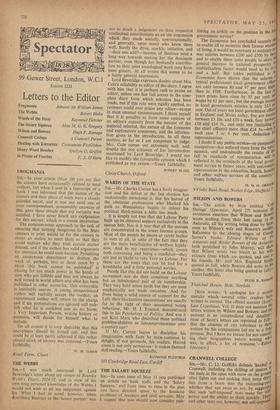THE SALARY SQUEEZE SIR.—In your issue of May 11 you
published an article on bank staffs and the `Salary Squeeze,' and from time to time- in the past you have devoted space to the financial problems of teachers and civil servants. May I suggest that you should now consider pub-
lishing an article on the position in the ic'ei government service? The Economist has concluded recently to enable all to maintain their former smile' of living, it would be necessary to multiplY war salaries between £200 and £700 by thrt and to enable these same people to share I," general increase in national prosperitY 111 multiplication factor would need to be th and a half. But tables published in I° Economist have shown that the salaries d typical professional local government officel are only between 80 and 97 per pent. bight, than in 1938. Furthermore, in the last le years prices have risen by 55 per cent. all wages by 61 per cent., but the average WO in local government salaries is only 33.1!c, cent. Out of every ten local government o111 in England and Wales today, five are earnio between £3 10s. and £10 a week, four betwee, £10 and £14 5s., and only one (including 3.1 the chief officers) more than £14 5s.--le55 each case 5 or 6 per cent. deduction le superannuation. I doubt if any public service—or comparabl occupation—has suffered more from the salar squeeze, and undoubtedly the results of fall in standards of remuneration will reflected in the standards of the local goverf, ment service in future years, with unfortun?' repercussions in the education, health, hoes' and other welfare services of the countrr Yours faithfully, M. G. G. GOO










































 Previous page
Previous page